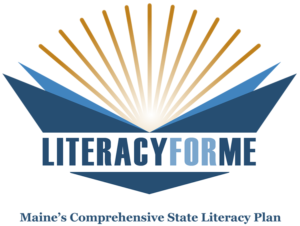Community Literacy Teams—The Heart of Literacy for ME
July 31, 2017 | Family Literacy, Community Partners
If you are wondering if literacy learning is on the minds and in the hearts of Mainers, it is easy to find evidence in local communities throughout the state.
As you drive around the state this summer, you may well see:
- children listening to books read aloud while eating meals at local summer food sites;
- families enjoying story-walks on community walking/hiking trails;
- children borrowing books from Little Free Libraries set up at favorite community spots, like municipal swimming pools and playgrounds;
- book festivals with a variety of literacy related activities for children and adults;
- book mobiles delivering reading materials in neighborhoods; and
- volunteer readers contributing time in summer reading programs held in libraries and schools.
These are just a few of the ways in which locally-based community literacy teams are collaborating to support literacy learning across Maine.
How did Community Literacy Teams get their start?
When the Maine Department of Education launched its Literacy for ME initiative in 2012, not only did it provide a robust plan to guide literacy education efforts, but it included assistance for local Maine communities to form their own community literacy teams.
Recognizing the significant impact literacy has on learning, employment opportunities, financial well-being, health, parenting and civic engagement, the community literacy team component of Literacy for ME is designed to encourage communities to thoughtfully coordinate local level resources to bolster literacy achievement. This grassroots effort has resulted in the formation of approximately 40 community literacy teams across Maine.
What are Community Literacy Teams?
Community literacy teams are composed of a variety of members with expertise and/or interest in literacy education for the children and adults in their communities. Teams examine the literacy learning successes and challenges in their communities, identify literacy education needs, and implement actions to target those needs using assets they have identified.
Typically, community literacy teams coordinate resources available through schools, libraries, child-care sectors, businesses and civic organizations (such as Literacy Volunteers, Rotary clubs and local Masonic groups) to enhance literacy learning opportunities. Literacy education efforts happen year round, and are often coordinated with other community-based offerings to maximize impact. Typically, making literacy learning visible and valuable are two of the most important goals of community literacy teams.
Literacy specialists in the Maine DOE provide technical assistance to teams, work to showcase team efforts, and support communities in forming new teams.
Additional Resources
 Resources that support the formation and work of community teams are available through the Literacy for ME website. If you are interested in supporting a community literacy team in your area, check the list of teams on the Literacy for ME website or contact Leann at leeann.larsen@maine.gov.
Resources that support the formation and work of community teams are available through the Literacy for ME website. If you are interested in supporting a community literacy team in your area, check the list of teams on the Literacy for ME website or contact Leann at leeann.larsen@maine.gov.
